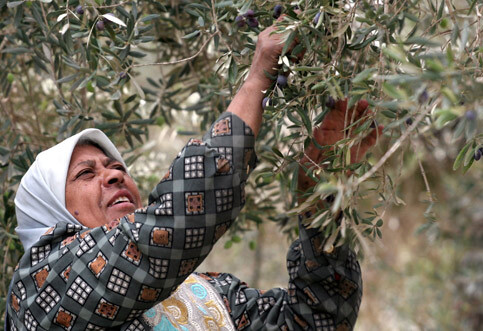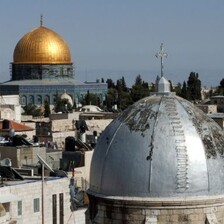The Electronic Intifada 20 April 2007

A Palestinian woman harvests olives in the village of Beit Wazan near the West Bank city of Nablus, 2 November 2006. (MaanImages/Rami Swidan)
The following is a speech given by Sam Bahour at the Second Annual Conference on Non-Violent Popular Resistance in the Palestinian village of Bil’in, April 18 - 20th, 2007.
“First, allow me to salute the people of Bil’in. Your steadfastness is being registered in the annals of history with every meter of Wall being built and every olive tree ripped from it roots by this deplorable occupation. I’ve been asked to speak briefly on Building Economic Independence. A complicated topic but let me start by posting a question.
How do we integrate a future Palestinian economy into a U.S.-dominated globalized world today, while yet still under foreign military occupation — an occupation operating in the full view of the international community? Yes, I speak of those third parties that are signatories to the Fourth Geneva Convention that, for the last year, and the majority through today, have opted to apply economic and political boycotts and sanctions against the occupied people, driving us to a nation of poverty, crime and lawlessness. How do we do all of this while our very own leadership drinks tea on a bimonthly basis with that very same occupier that is removing, by daily actions on the ground, the option of a meaningful Palestinian independence?
For 40 years, Israel linked the occupied Palestinian territory economy to its own. By design, an economic umbilical cord was weaved into every one of our sectors. To fast forward for the sake of time, it is worthy to note that the Oslo Peace Accords kept that umbilical cord fully attached, while at the same time laying on the Palestinian side the colossal burden of meeting the challenges of economic development without having the access to the full toolbox of economic resources.
State donors entered the picture. Instead of rising to the obligations placed upon them in the Fourth Geneva Convention to ensure no harm be done to the occupied people, the ‘protected people’ as we are classified under international law, these third party states began feeding us fish instead of assisting us to learn how to fish for ourselves. In short, donors have become accomplices to the economic repression and sustaining of the status quo that is simmering us to death as we stand and struggle here today.
Donors are not the only players in the equation. Sustainable development cannot be based on the agenda and political moods of foreign donors. Palestinian business and Palestinian consumers are, or should I say should, be the foundations in which we build our economy upon. It would be unfair to say the Palestinian business community has failed, it has not. Many businesses have remained steadfast in the face of unimaginable odds. Many others have been exceedingly successful. However, the success criteria of many of the movers and shakers in our business community needs scrutinized. Is success a single firm extracting an annual $100 million profit from the occupied people for a basic service? Is success considering building of industrial zones between this Apartheid Wall and the Green Line? Is success the monopolization of the various sectors and blocking new investments and new jobs from being created? As I noted, thousands of business are doing amazing things to keep their doors open, but a few movers and shakers have no intention of moving or shaking the occupation out of our lives and it is these elements of our own society we must hold accountable.
Accountability cannot come from an expired Authority, pre-occupied with factional politics, despite our love of those trying to make it an operational body. The Palestinian citizen, the Palestinian consumer, and those in solidarity with Palestinians must carry the burden.
I cannot comprehend how we can peacefully co-exist with Israeli settlement products on our shelves. I cannot comprehend how we can allow Israeli firms to dump their products and services into our market with no repercussions whatsoever. I cannot comprehend how third party states refuse to take on their obligations under the Fourth Geneva Convention when they see the economic roadblocks, checkpoints and Walls that Israel has constructed.
Our land is being grabbed by the hour. Through what our good friend, Jeff Halper, coined a “matrix of control” Israel is making sure land is not sufficient for daily life, let alone economic independence. The hand of occupation controls the lands we can cultivate and the destiny of the trees that we plant.
We are forced to buy our water from the Israeli water company, paying more than Israelis buying from the same source but using less per capita. The hand of occupation controls our water facets.
All of the West Bank electricity is bought from the Israeli Electric Company and resold to us. The hand of occupation controls our light switches.
Every telephone call all you make abroad is forced to go through an Israeli operator. The hand of occupation controls our conversations.
Every laborer wanting to work in Israel, or on their land west of the wall for that matter, must be issued an Israeli permit. The hand of occupation controls the sweat of our workers.
For the first time ever in our history, over a 1/3 of Palestinians in the West Bank, Gaza and East Jerusalem desire to voluntarily emigrate. Over a 1/3! I should note that International Humanitarian Law is clear about war crimes. The bloody events of 1948 and 1967 and 2002 were all war crimes no doubt – a military occupation, drunk on power – still drink on power – bent on destroying the fabric of Palestinian society with results well known to you all. But it is an equal war crime under the laws of occupation for the “occupying power,” that’s Israel if we have forgotten, to create the conditions for the occupied people to voluntary to be left with no option but to leave their homes in search of security and a livelihood. I add to this the new Israeli policy of outright denying entry to those of us that are prevented by Israel of ascertaining residency. This denied entry policy is separating families and contributing to faster pace of our brain drain. I tend to call all of this a sterile ethnic cleansing, one that happens one family at a time, far from any media and bloodless.
This is our reality. A reality many try to brush aside or under the carpet while pretending to be building or contributing to a viable state. Such a reality is incompatible with viability. Such a reality is not conducive to building economic independence.
So what do we do? Fold up? Hide under a rock and hope for the best? Accept and acquiesce the foreign military occupation that has kept its boot on our necks for the last 40 years and which has separated us from our people for 60 years?
No, not this people! We may not yet know how to win and end this nightmare, but I can assure you we definitely know how not to lose. As we, as a community, make our structural adjustment to our internal politics, new leadership is bound to emerge. As we learn and master the tools of our oppressors, our just case will be articulated online, offline, around the wall, and over the wall. As we focus on what matters in life: people, family, community and our inalienable rights, more focus will be placed on our ability to create Global Development Partnerships, our own kind of GDP, rather than chase the World Bank’s traditional measure of GDP.
Our GDP includes all of those laborious hours mothers spend up keeping their children’s sanity and maintaining family life. Our GDP includes the efforts that all our political prisoners spend remaining steadfast in Israeli prisons. Our GDP is Global in scope, Developmental in substance, and in Partnership with peace and justice loving people wherever they reside.
I’m sorry if I disappointed you by not talking about the many economic accomplishments over the last decade, several which I had the honor of contributing to. It is not that I’m not proud that, under odds most communities would have buckled under, we have built productive companies, a stock market, a banking industry, an ICT industry, an olive oil industry, a furniture industry, and a pharmaceutical industry, among others.
These are all important but they are all trappings of a status quo that is taking us to a level of despair, unknown to our struggle. In a normal environment, as a private sector player, I would yearn for return on investments. In Palestine, I challenge my peers to translate that return to:
The return to international law; The return to recognized borders; The return of our political prisoners to their families; The return of our refugees; and the return to community building. These returns are the only returns that will put us on the path toward economic independence. In closing, I want to note a quote passed to me by an Israeli friend of mine in Jerusalem. One of the Jewish sages, someone famous in Judaism, from the 17th Century; Rabbi Nachman from Bratzlav once said, “There is nothing that is more whole than a broken heart”. My friend said that “this is not so easy to see from within.” I agree.
Sam Bahour is a Palestinian-American business consultant and activist based in Ramallah/Al-Bireh. He is co-author of HOMELAND: Oral Histories of Palestine and Palestinians.
Related Links





